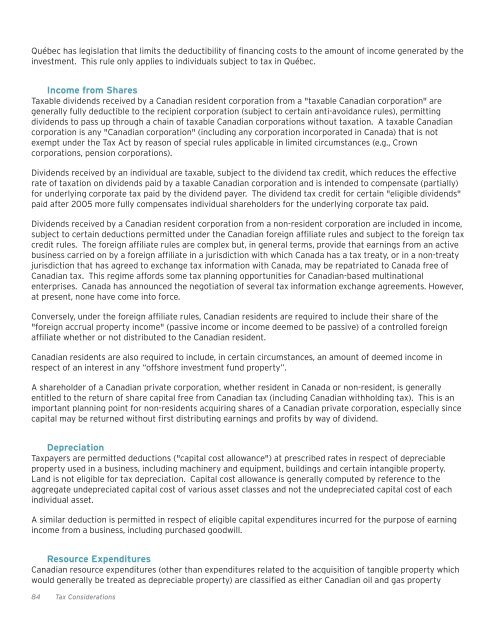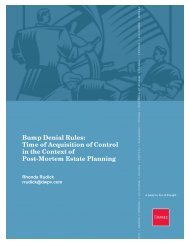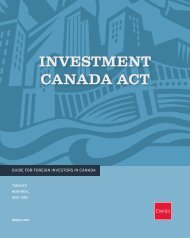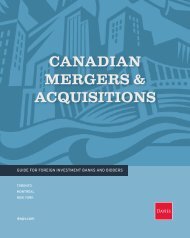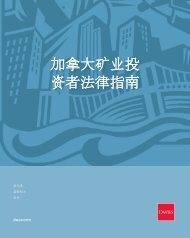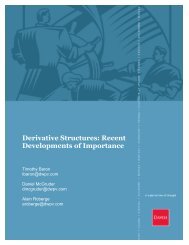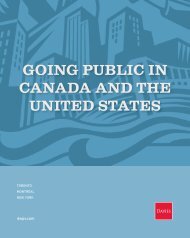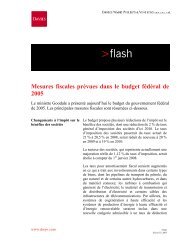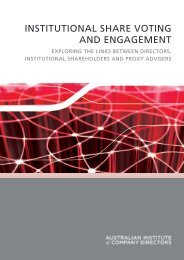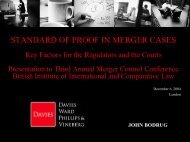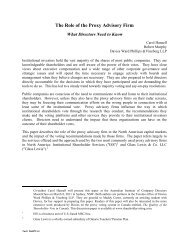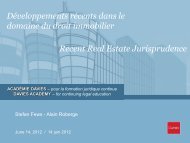doing business in canada - Davies Ward Phillips & Vineberg LLP
doing business in canada - Davies Ward Phillips & Vineberg LLP
doing business in canada - Davies Ward Phillips & Vineberg LLP
- No tags were found...
You also want an ePaper? Increase the reach of your titles
YUMPU automatically turns print PDFs into web optimized ePapers that Google loves.
Québec has legislation that limits the deductibility of f<strong>in</strong>anc<strong>in</strong>g costs to the amount of <strong>in</strong>come generated by the<strong>in</strong>vestment. This rule only applies to <strong>in</strong>dividuals subject to tax <strong>in</strong> Québec.Income from SharesTaxable dividends received by a Canadian resident corporation from a "taxable Canadian corporation" aregenerally fully deductible to the recipient corporation (subject to certa<strong>in</strong> anti-avoidance rules), permitt<strong>in</strong>gdividends to pass up through a cha<strong>in</strong> of taxable Canadian corporations without taxation. A taxable Canadiancorporation is any "Canadian corporation" (<strong>in</strong>clud<strong>in</strong>g any corporation <strong>in</strong>corporated <strong>in</strong> Canada) that is notexempt under the Tax Act by reason of special rules applicable <strong>in</strong> limited circumstances (e.g., Crowncorporations, pension corporations).Dividends received by an <strong>in</strong>dividual are taxable, subject to the dividend tax credit, which reduces the effectiverate of taxation on dividends paid by a taxable Canadian corporation and is <strong>in</strong>tended to compensate (partially)for underly<strong>in</strong>g corporate tax paid by the dividend payer. The dividend tax credit for certa<strong>in</strong> "eligible dividends"paid after 2005 more fully compensates <strong>in</strong>dividual shareholders for the underly<strong>in</strong>g corporate tax paid.Dividends received by a Canadian resident corporation from a non-resident corporation are <strong>in</strong>cluded <strong>in</strong> <strong>in</strong>come,subject to certa<strong>in</strong> deductions permitted under the Canadian foreign affiliate rules and subject to the foreign taxcredit rules. The foreign affiliate rules are complex but, <strong>in</strong> general terms, provide that earn<strong>in</strong>gs from an active<strong>bus<strong>in</strong>ess</strong> carried on by a foreign affiliate <strong>in</strong> a jurisdiction with which Canada has a tax treaty, or <strong>in</strong> a non-treatyjurisdiction that has agreed to exchange tax <strong>in</strong>formation with Canada, may be repatriated to Canada free ofCanadian tax. This regime affords some tax plann<strong>in</strong>g opportunities for Canadian-based mult<strong>in</strong>ationalenterprises. Canada has announced the negotiation of several tax <strong>in</strong>formation exchange agreements. However,at present, none have come <strong>in</strong>to force.Conversely, under the foreign affiliate rules, Canadian residents are required to <strong>in</strong>clude their share of the"foreign accrual property <strong>in</strong>come" (passive <strong>in</strong>come or <strong>in</strong>come deemed to be passive) of a controlled foreignaffiliate whether or not distributed to the Canadian resident.Canadian residents are also required to <strong>in</strong>clude, <strong>in</strong> certa<strong>in</strong> circumstances, an amount of deemed <strong>in</strong>come <strong>in</strong>respect of an <strong>in</strong>terest <strong>in</strong> any “offshore <strong>in</strong>vestment fund property”.A shareholder of a Canadian private corporation, whether resident <strong>in</strong> Canada or non-resident, is generallyentitled to the return of share capital free from Canadian tax (<strong>in</strong>clud<strong>in</strong>g Canadian withhold<strong>in</strong>g tax). This is animportant plann<strong>in</strong>g po<strong>in</strong>t for non-residents acquir<strong>in</strong>g shares of a Canadian private corporation, especially s<strong>in</strong>cecapital may be returned without first distribut<strong>in</strong>g earn<strong>in</strong>gs and profits by way of dividend.DepreciationTaxpayers are permitted deductions ("capital cost allowance") at prescribed rates <strong>in</strong> respect of depreciableproperty used <strong>in</strong> a <strong>bus<strong>in</strong>ess</strong>, <strong>in</strong>clud<strong>in</strong>g mach<strong>in</strong>ery and equipment, build<strong>in</strong>gs and certa<strong>in</strong> <strong>in</strong>tangible property.Land is not eligible for tax depreciation. Capital cost allowance is generally computed by reference to theaggregate undepreciated capital cost of various asset classes and not the undepreciated capital cost of each<strong>in</strong>dividual asset.A similar deduction is permitted <strong>in</strong> respect of eligible capital expenditures <strong>in</strong>curred for the purpose of earn<strong>in</strong>g<strong>in</strong>come from a <strong>bus<strong>in</strong>ess</strong>, <strong>in</strong>clud<strong>in</strong>g purchased goodwill.Resource ExpendituresCanadian resource expenditures (other than expenditures related to the acquisition of tangible property whichwould generally be treated as depreciable property) are classified as either Canadian oil and gas property84 Tax Considerations


